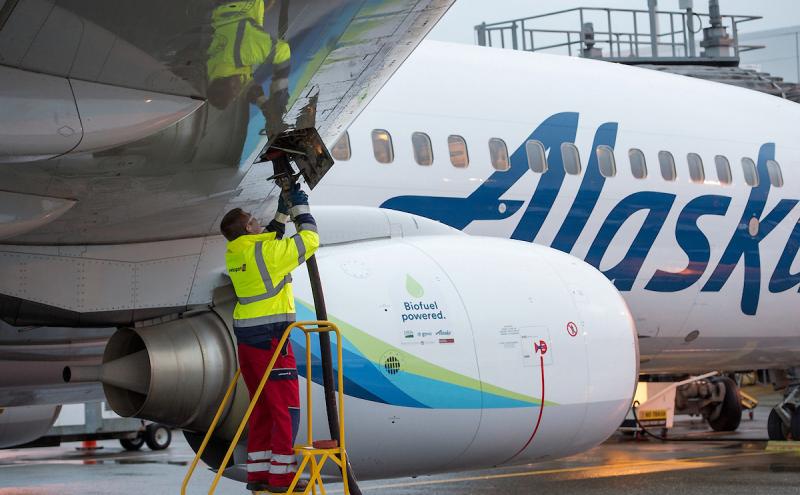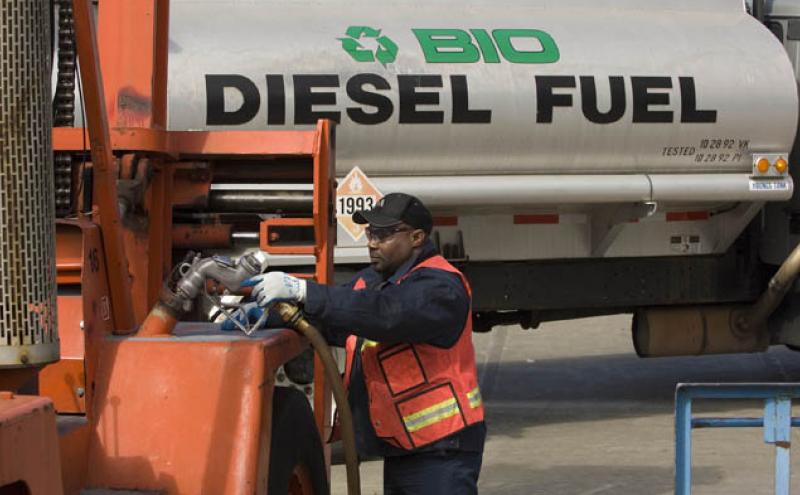
The State of Washington is a leader in the advancement of innovations in aviation, agriculture and the environment. All of these sectors are now converging in the development of sustainable aviation fuels across Washington State.
Sustainable Aviation Fuels Summit
On March 7-8, Earth Day Northwest 2020 is hosting the first-ever Washington Sustainable Aviation Fuels Summit in Seattle. The Port of Seattle, Boeing, Alaska Airlines, and Delta Air Lines, are sponsoring the event. Port Commissioners Fred Felleman and Ryan Calkins will both speak at the conference. Follow @EarthDayNW2020 on Facebook for free live streams of key panels.
“We must pursue the development of sustainable aviation fuels with urgency in order to address the looming climate crisis and to protect the health of communities neighboring Sea-Tac Airport,” explained Port of Seattle Commissioner Fred Felleman.
“The Port of Seattle is uniquely positioned to create markets for sustainably sourced feedstocks that can cost-effectively reduce the use of petroleum-based fuel through the development of partnerships with aviation, agriculture, finance, and public policy. We appreciate the efforts of all the local leaders in academia, business, and government who recognize that we are at an urgent time for our environment and are helping make progress towards a clean energy economy,” said Commissioner Felleman.
Port of Seattle Commission policies have helped make local sustainable aviation fuels a possibility for our region. In December 2017 the Commission became the first airport in the country to establish goals that would increase the amount of local sustainable aviation fuel that the Port would deploy by 2028, 2035, and 2050, sending a clear signal that there will be a Washington market for lower-carbon fuels. In May 2018 the Port announced that 13 airlines signed a memorandum of understanding committing to work together to bring SAF to Sea-Tac Airport. In November 2018, Commissioners budgeted $5 million in the Port’s 2019 budget to support the development of a SAF workplan.
What are Sustainable Aviation Fuels?
Sustainable aviation fuels (SAF) are jet fuel just like petroleum fuels, but are made from a renewable resource as opposed to petroleum. They are currently available on the market, contain the same molecules in conventional fuels, and are blended at a maximum of 50 percent with conventional fuels.
What are they made from?
Sustainable aviation fuels are not made from fossil fuels, but from renewable resources such as:
- Forest residuals (limbs and branches left after tree harvest) and other tree products
- Agricultural residuals like woody materials, wheat straws, or oily seeds
- Municipal solid waste
- Fats, oils, and greases
What Are the Benefits of Sustainable Aviation Fuels?
Sustainable aviation fuels benefit the environment and the economy in several ways. The use of sustainable aviation fuels benefits the environment by:
- Lowering carbon emissions of burning the fuel by a minimum of 50 percent or up to 80 percent that of conventional fuel
- Protecting water and air quality because of the low sulphur content
- Reducing particulate matter (soot) significantly
Feedstocks — the materials that sustainable aviation fuels are made from like trees, agricultural products, and municipal solid waste — can come from rural communities. Fuels are made close to the source of the feedstock, bringing tremendous economic benefits to the communities where the feedstocks are grown and processed.
Why should sustainable aviation fuels be developed in Washington State?
The Port of Seattle supports development of a local supply of sustainable aviation fuel to provide our state with environmental and economic benefits.
Currently, Washington state is home to several innovative biofuel production companies that are manufacturing their products in Washington but selling their products out of state to California, Oregon, and British Columbia. In those jurisdictions, the presence of a statewide “clean fuel standard” policy creates a market for sustainable fuels that we do not have in Washington.
In 2017, the state’s Aviation Biofuels Work Group submitted recommendations to the Legislature that identified a statewide clean fuel standard as key to full-scale implementation of SAF.
How is the Port of Seattle involved?
The Port of Seattle has set a goal that sustainable aviation fuels will help power every flight at Sea-Tac Airport by 2028.
Here’s what the Port and Sea-Tac Airport have been doing (and will continue to do) to help advance that goal:
1. Developing the infrastructure for commercial production of SAF at the airport
In 2016, the Port partnered with Boeing and Alaska Airlines to investigate the best locations to store and blend SAF into the airport’s fueling systems. The report identified key locations on and off the airport’s property.
2. Identifying financial sources
The Port has been investigating the feasibility of using different airport revenue streams at Sea-Tac to help bring down the cost to all airlines compared to petroleum jet fuel, and identify ways an airport could be involved without directly paying for fuel.
3. Selecting land for SAF production
Through government partnerships, the Port is helping to identify locations for blending or production facilities
4. Continuing advocacy
The Port is helping to educate citizens, passengers, businesses, and elected officials to reduce barriers and help create incentives for SAF use. Attend the Washington Sustainable Aviation Fuels Summit this week.
5. Maintaining partnerships
The Port has worked to develop partnerships that aggregate demand for fuel and send a strong market signal for SAF production here in Washington state.
6. Fostering a market for SAF
With partners, the Port has been studying the commercialization of SAF in Washington state.
What’s happening in Washington state to develop sustainable aviation fuels?
Work continues on the development of sustainable aviation fuel in Washington through the following partnerships and working groups:
ASCENT
ASCENT is a cooperative aviation research organization co-led by Washington State University and the Massachusetts Institute of Technology. Also known as the Center of Excellence for Alternative Jet Fuels and Environment, ASCENT is funded by the FAA, NASA, the Department of Defense, Transport Canada, and the Environmental Protection Agency. ASCENT studies the economic and environmental benefits of alternative jet fuels, looks at the combustion properties, develops testing methodologies to make them safely and certify the fuels, and studies emissions and the impacts on the aviation sector across the country. Link
Washington State University/Pacific Northwest National Laboratory
A WSU Partnership with Pacific Northwest National Laboratory (PNNL) in the Tri-Cities region that focuses on developing technologies to produce alternative jet fuels and supply chains in the Pacific Northwest. Link
FAA
In partnership with the Federal Aviation Administration, ASCENT creates scenarios around whether alternative jet fuel were deployed throughout the country, and how would it impact carbon dioxide emissions around the country or at a local airport.
Sustainable Aviation Fuels Northwest
A collaborative partnership between Sea-Tac Airport, Boeing, Alaska Airlines and Washington State University (with 50 stakeholders) to develop a collective vision on what sustainable aviation fuel development would look like in the northwest.










